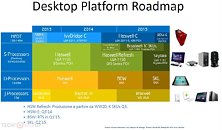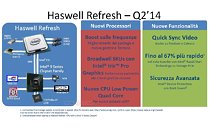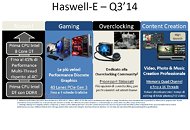- Joined
- Oct 9, 2007
- Messages
- 47,670 (7.43/day)
- Location
- Dublin, Ireland
| System Name | RBMK-1000 |
|---|---|
| Processor | AMD Ryzen 7 5700G |
| Motherboard | Gigabyte B550 AORUS Elite V2 |
| Cooling | DeepCool Gammax L240 V2 |
| Memory | 2x 16GB DDR4-3200 |
| Video Card(s) | Galax RTX 4070 Ti EX |
| Storage | Samsung 990 1TB |
| Display(s) | BenQ 1440p 60 Hz 27-inch |
| Case | Corsair Carbide 100R |
| Audio Device(s) | ASUS SupremeFX S1220A |
| Power Supply | Cooler Master MWE Gold 650W |
| Mouse | ASUS ROG Strix Impact |
| Keyboard | Gamdias Hermes E2 |
| Software | Windows 11 Pro |
Intel's presentation for Italian technology conference 3D Revolution 2014 was leaked to the web, revealing the company's most up-to-date desktop CPU roadmap, which looks deep into 2015. It reveals a wealth of new information. To begin with the HEDT (high-end desktop) segment, Intel plans to drag Core i7 "Ivy Bridge-E" through Q3-2014, and launch its succeeding Core i7 "Haswell-E" processor close to Q4-2014, or late into Q3, which would pin its launch some time in September 2014. "Haswell-E" is built in the new socket LGA2011-3 package, and is supported exclusively by Intel X99 Express chipset. It also heralds DDR4 memory to the consumer space. "Haswell-E" will have its reign till late-Q3 2015, when Intel plans to launch Core i7 "Broadwell-E," which is built in the same package, and supported by the same X99 platform, but based on a swanky new 14 nm silicon.
Things get interesting with the company's mainline desktop processors. Intel recently launched its "Haswell" Refresh silicon, and is bound to launch their unlocked variants, codenamed "Devil's Canyon," on the 25th of June. Built in the LGA1150 package, "Haswell" Refresh runs on both 8-series and 9-series chipset. Intel's 9-series chipset was originally designed to launch alongside the company's first processors built on the 14 nm silicon fab process, codenamed "Broadwell," which is an optical shrink of "Haswell," with a few minor tweaks and speed bumps, just as "Ivy Bridge" was to "Sandy Bridge." Intel's "Broadwell" chips are now expected to debut in Q1-2015, probably along the sidelines of the 2015 International CES. These chips will be supported by existing LGA1150 motherboards, some with BIOS updates.




In mid-2015, probably around the same time as Computex 2015, Intel plans to debut its next-generation Core "Skylake" processors. Notice that "Skylake" launches less than six months apart from "Broadwell." It looks like Intel will launch unlocked "K" series parts of "Broadwell" in Q1, but reserve unlocked "K" series "Skylake" chips for 2016, so overclockers are stuck with "Broadwell." It's also important to note that just as every new micro-architecture heralds a new CPU socket, "Skylake" will bring with it the new LGA1151 socket, which is incompatible with LGA1150.
Moving further down to the U-segment (ultra-low power desktop), in which chips that don't exceed 25W TDP are positioned, Intel plans to launch "Broadwell" based BGA chips in a couple of months from now, followed by "Skylake" based BGA chips in mid-2015. The entry-level J-segment processors sees the scrapping of the Atom brand, with Celeron and Pentium "BayTrail-D" extending till late-December, and "Braswell-D" taking charge of the lineup in early-2015.
View at TechPowerUp Main Site
Things get interesting with the company's mainline desktop processors. Intel recently launched its "Haswell" Refresh silicon, and is bound to launch their unlocked variants, codenamed "Devil's Canyon," on the 25th of June. Built in the LGA1150 package, "Haswell" Refresh runs on both 8-series and 9-series chipset. Intel's 9-series chipset was originally designed to launch alongside the company's first processors built on the 14 nm silicon fab process, codenamed "Broadwell," which is an optical shrink of "Haswell," with a few minor tweaks and speed bumps, just as "Ivy Bridge" was to "Sandy Bridge." Intel's "Broadwell" chips are now expected to debut in Q1-2015, probably along the sidelines of the 2015 International CES. These chips will be supported by existing LGA1150 motherboards, some with BIOS updates.




In mid-2015, probably around the same time as Computex 2015, Intel plans to debut its next-generation Core "Skylake" processors. Notice that "Skylake" launches less than six months apart from "Broadwell." It looks like Intel will launch unlocked "K" series parts of "Broadwell" in Q1, but reserve unlocked "K" series "Skylake" chips for 2016, so overclockers are stuck with "Broadwell." It's also important to note that just as every new micro-architecture heralds a new CPU socket, "Skylake" will bring with it the new LGA1151 socket, which is incompatible with LGA1150.
Moving further down to the U-segment (ultra-low power desktop), in which chips that don't exceed 25W TDP are positioned, Intel plans to launch "Broadwell" based BGA chips in a couple of months from now, followed by "Skylake" based BGA chips in mid-2015. The entry-level J-segment processors sees the scrapping of the Atom brand, with Celeron and Pentium "BayTrail-D" extending till late-December, and "Braswell-D" taking charge of the lineup in early-2015.
View at TechPowerUp Main Site







